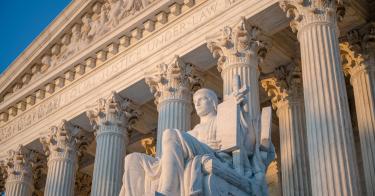Nominating justices to the U.S. Supreme Court is one of a president’s most important constitutional responsibilities. It is spelled out clearly in Article II of our founding document, the U.S. Constitution, and it’s happened over 100 times in our country’s history.
But like so many things in America today, a Supreme Court nomination is a highly politicized affair. Many of our modern-day problems date to the left’s hysterical attacks on President Ronald Reagan’s nomination of Robert Bork to the court in 1987.
They’ve only intensified since.
Justice Brett Kavanaugh’s 2018 confirmation process was abhorrent. The U.S. Senate, which provides a check on the president through its “advice and consent” role, deserves much of the blame.
It took just 42 days to confirm the late Justice Ruth Bader Ginsburg in 1993—who, despite her years of advocating on behalf of liberal causes, ultimately won the support of 96 senators. President Donald Trump has promised to nominate Ginsburg’s successor as early as this week. He’s also indicated that his choice will be a woman.
There is absolutely no reason for senators who support the president’s nominee and who are satisfied with her credentials to reject her on the basis of timing.
When President Trump nominates his candidate this week, he will join 22 former presidents in making an election-year nomination. The Constitution confers the power to confirm Supreme Court nominees to the Senate, and they should base their determination on the suitability of the nominee rather than disabuse themselves of their constitutional authority.
Senators should not be cowed into giving up their constitutional power in response to tired political threats. In the hours after Justice Ginsburg’s death, sadly, many Democrats began to threaten revenge if a replacement is confirmed by anyone but them.
They’ve threatened to “pack the court” with several new Supreme Court seats if they win the majority in the Senate, keep the House and win the presidency. They’ve also implicitly threatened continued violence and civil unrest in American cities if another Trump nominee is put on the court.
Senators must not give in to these threats. They are an anathema to our very system of representative democracy. And as history shows, appeasement only makes tyrants more aggressive.
It is Trump’s prerogative, just as it was President Barack Obama’s before him, to nominate whomever he wishes. Fortunately, as we near the opening of the Supreme Court’s next term, he’s prepared to move swiftly.
That’s because Trump, unlike his predecessors, has taken the unprecedented step of releasing a list of people he would choose from prior to each nomination. It has proven to be the most transparent nominating process in American history. He added to his list earlier this month and included the names of several well-qualified individuals recommended by my colleagues at The Heritage Foundation.
The individuals on the president’s list understand that we are a nation based on the rule of law, and they are dedicated to the preservation of a constitutional republic. Thus, they are originalists who would issue rulings based on the Constitution and the law rather than on their favored political or policy outcome.
Almost 200 years ago, Alexis de Tocqueville observed the unique role of the Supreme Court: “I am unaware that any nation of the globe has hitherto organized a judicial power in the same manner as the Americans. … A more imposing judicial power was never constituted by any people.”
The role of the Supreme Court is just as vital today as it was then. That’s why any vacancy, except in rare circumstances, must be filled promptly.
The people on the president’s list have all proven themselves tremendous public servants with a true fidelity to the Constitution. Any one of them would be an excellent choice to serve on the nation’s highest court.
The court already has a full docket of important cases to decide for its next term. And those are just the ones we know about today. There’s ample reason to be concerned that we might find ourselves in another Bush v. Gore scenario, where the nation’s highest court needs to settle decisions regarding the next presidential election.
We need a full bench with nine justices so that ties can be broken, decisions can be final, and the court can continue its critical work without delay.
This piece originally appeared in Fox News




